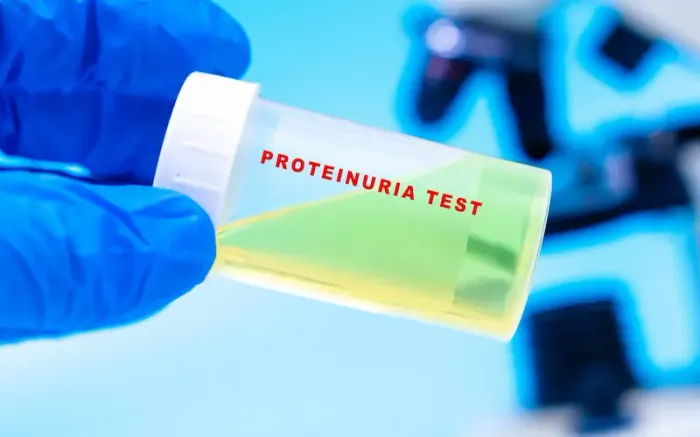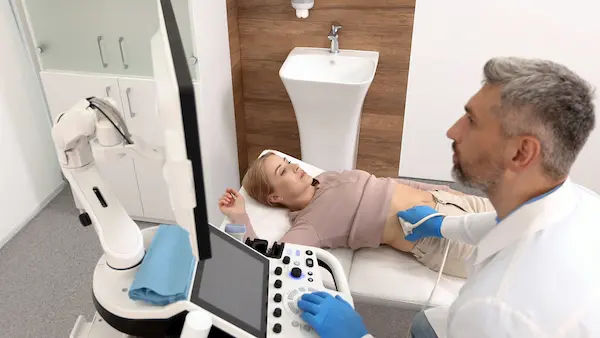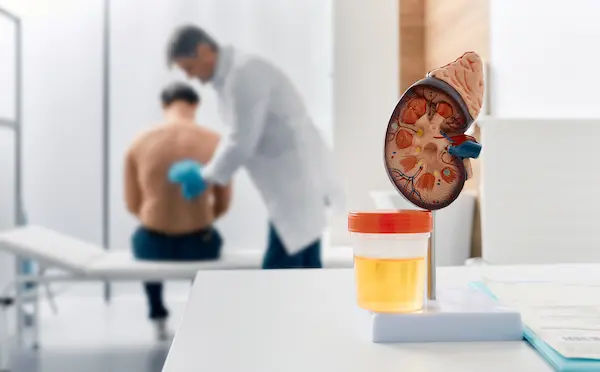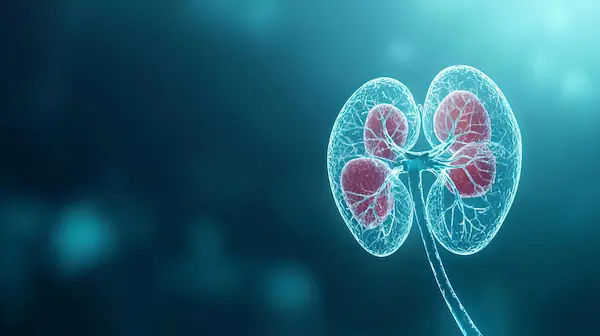Protein in Urine Causes and Treatment
Discover the causes of protein in urine (proteinuria), from temporary issues to kidney disease, and explore the diagnosis and treatment options to protect your health.

Written by Dr. Md Yusuf Shareef
Reviewed by Dr. Rohinipriyanka Pondugula MBBS
Last updated on 13th Jan, 2026

Finding out that you have protein in your urine can be concerning, but understanding what it means and how to manage it can help ease your worries. This article explains the causes, symptoms, and treatment options for proteinuria (the medical term for protein in urine) in simple terms.
What Does Protein in Urine Mean?
Normally, your kidneys filter waste and excess fluids from your blood while keeping essential proteins inside. However, if your kidneys aren’t working properly, some protein may leak into your urine. A small amount of protein in urine is common, but high levels could indicate an underlying health issue.
Common Causes of Protein in Urine
Several factors can lead to proteinuria, including:
1. Dehydration – Not drinking enough water can temporarily increase protein levels in urine.
2. High Blood Pressure (Hypertension) – Uncontrolled high blood pressure can damage kidney filters.
3. Diabetes – High blood sugar levels can harm the kidneys over time.
4. Kidney Disease – Conditions like chronic kidney disease (CKD) or glomerulonephritis can cause protein leakage.
5. Infections or Fever – Temporary proteinuria may occur during infections like UTIs.
6. Pregnancy (Preeclampsia) – Excess protein in urine during pregnancy may indicate preeclampsia, a serious condition.
7. Strenuous Exercise – Intense workouts can sometimes cause temporary proteinuria.
Symptoms of Proteinuria
In mild cases, proteinuria may not cause noticeable symptoms. However, if protein levels are high, you may experience:
• Foamy or bubbly urine
• Swelling (edema) in hands, feet, or face
• Fatigue or weakness
• Frequent urination
• High blood pressure
If you notice these symptoms, it’s important to consult a doctor for further testing.
How Is Protein in Urine Diagnosed?
Doctors use simple tests to detect protein in urine:
1. Urine Dipstick Test – A quick test that checks for protein levels.
2. 24 Hour Urine Collection – Measures the exact amount of protein excreted in a day.
3. Blood Tests – Assess kidney function and overall health.
If your test shows high protein levels, your doctor may recommend additional tests to determine the underlying cause.
Consult a General Physician for best advice
Treatment and Management
The treatment for proteinuria depends on its cause:
1. Lifestyle Changes
• Stay Hydrated – Drinking enough water helps kidneys function properly.
• Reduce Salt Intake – Excess salt can increase blood pressure and kidney strain.
• Eat a Balanced Diet – Include lean proteins, whole grains, and fresh vegetables while limiting processed foods.
• Exercise Regularly – Moderate physical activity supports kidney health.
• Control Blood Sugar & Blood Pressure – If you have diabetes or hypertension, managing these conditions is crucial.
2. Medications
• ACE Inhibitors or ARBs – These blood pressure medications also help reduce protein leakage.
• Diuretics – May be prescribed to reduce swelling.
• Diabetes Medications – Keeping blood sugar under control prevents kidney damage.
3. Regular Monitoring
If you have chronic kidney disease or diabetes, regular urine and blood tests help track kidney function.
When to See a Doctor?
Consult a doctor if:
• You notice persistent foamy urine.
• You have swelling in your legs, hands, or face.
• You experience fatigue, nausea, or changes in urination.
Early detection and treatment can prevent further kidney damage.
Can Proteinuria Be Prevented?
While some causes (like genetic conditions) can’t be prevented, you can reduce risks by:
• Maintaining a healthy weight
• Avoiding excessive protein supplements
• Managing chronic conditions like diabetes and hypertension
• Staying hydrated
Need Help? Consult a Specialist on Apollo 24|7
If you’re concerned about protein in your urine or have symptoms of kidney issues, don’t hesitate to seek medical advice. You can book a consultation with a nephrologist or get a urine test easily through Apollo 24|7. Early diagnosis and proper care can make a big difference in your kidney health.
Final Thoughts
Protein in urine isn’t always a serious issue, but it shouldn’t be ignored. With the right lifestyle changes and medical care, you can manage proteinuria effectively. If you have any concerns, reach out to a healthcare professional for guidance.
Stay informed, stay healthy!
Consult a General Physician for best advice
Consult a General Physician for best advice

Dr. Rajib Ghose
General Physician/ Internal Medicine Specialist
25 Years • MBBS
East Midnapore
VIVEKANANDA SEBA SADAN, East Midnapore

Dr. Rohit Basu
General Practitioner
8 Years • MBBS, DNB (General surgery)
East Midnapore
VIVEKANANDA SEBA SADAN, East Midnapore

Dr. Abhishek Ranjan
General Practitioner
4 Years • MBBS
Kolkata
VDC Clinic, Kolkata

Dr. Vivek D
General Physician
4 Years • MBBS
Bengaluru
PRESTIGE SHANTHINIKETAN - SOCIETY CLINIC, Bengaluru

Dr. Sougata Kumar
General Practitioner
8 Years • MBBS
East Midnapore
VIVEKANANDA SEBA SADAN, East Midnapore
Consult a General Physician for best advice

Dr. Rajib Ghose
General Physician/ Internal Medicine Specialist
25 Years • MBBS
East Midnapore
VIVEKANANDA SEBA SADAN, East Midnapore

Dr. Rohit Basu
General Practitioner
8 Years • MBBS, DNB (General surgery)
East Midnapore
VIVEKANANDA SEBA SADAN, East Midnapore

Dr. Abhishek Ranjan
General Practitioner
4 Years • MBBS
Kolkata
VDC Clinic, Kolkata

Dr. Vivek D
General Physician
4 Years • MBBS
Bengaluru
PRESTIGE SHANTHINIKETAN - SOCIETY CLINIC, Bengaluru

Dr. Sougata Kumar
General Practitioner
8 Years • MBBS
East Midnapore
VIVEKANANDA SEBA SADAN, East Midnapore

_1.webp)


